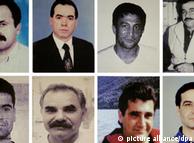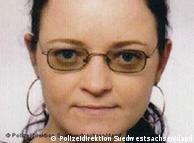RIGHT-WING EXTREMISM | 18.11.2011
State and federal ministers meet to discuss neo-Nazi murders
Federal and state interior and justice ministers meet in Berlin on Friday to discuss the recently uncovered neo-Nazi cell, believed to be responsible for the murders of 10 people since 2000.
The meeting comes as state and federal authorities came under criticism for their failure to connect the various murders. Eight of the victims were of Turkish descent, one of Greek descent and one was a police officer.
Justice Minister Sabine Leutheusser-Schnarrenberger acknowledged the criticism and said federal authorities would conduct a "competent, goal-oriented and effective" investigation.
 Leutheusser-Schnarrenberger acknowledged the criticism of justice authorities"We are all asking how it could be that the security authorities allowed it to be possible for a known group of neo-Nazis to go underground at the end of the '90s and apparently over 13 years murder people in various German cities, carry out bombing attacks, and lethally attack police officers," she told reporters on Thursday.
Leutheusser-Schnarrenberger acknowledged the criticism of justice authorities"We are all asking how it could be that the security authorities allowed it to be possible for a known group of neo-Nazis to go underground at the end of the '90s and apparently over 13 years murder people in various German cities, carry out bombing attacks, and lethally attack police officers," she told reporters on Thursday.Leutheusser-Schnarrenberger added that the investigation must determine whether the group was "a small defined group of people or a widely linked network, whether there were clandestine sympathizers in Germany or elsewhere."
German federal authorities took over the investigation into the murders on Friday under national anti-terrorism laws, choosing to treat the neo-Nazi cell as a domestic terrorist organization.
Three main suspects, one accomplice
Two people have been arrested in the investigation: the cell's suspected co-founder, 36-year-old Beate Z., and a suspected supporter, 37-year-old Holger G. Their last names are withheld accordning to German privacy standards.
Beate Z. turned herself into the authorities last week, but has refused to cooperate in investigations. She is thought to be a close associate of the two main, deceased suspects, Uwe Böhnhardt, 34, and Uwe Mundlos, 38. Böhnhardt and Mundlos appear to have shot themelves inside a mobile home after police connected them to a bank robbery in the central city of Eisenach. When authorities reached the mobile home it had been torched - it is unclear whether the men set it alight before killing themselves or whether another party was involved.
 The murders were clearly targeting Germany's immigrant communitiesA search through Holger G.'s apartment near the northern city of Hanover came up with a script for a right-wing propaganda film. He is suspected of giving his passport and driver's license to the other three, as well as renting apartments for them.
The murders were clearly targeting Germany's immigrant communitiesA search through Holger G.'s apartment near the northern city of Hanover came up with a script for a right-wing propaganda film. He is suspected of giving his passport and driver's license to the other three, as well as renting apartments for them.The group called itself the National Socialist Underground (NSU) and is believed to have been formed in 1998. In addition to the 10 murders, authorities are investigating suspected connections to several unsolved crimes, including attacks in the western cities of Cologne and Dusseldorf from 2000 to 2004, as well as bank robberies.
Series of gaffes
As more details of the neo-Nazi cell's activities emerge, criticism is growing on the authorities for missed opportunities and poor information sharing.
In 1998, before the first murder attributed to the group, investigators found four pipe bombs and explosive materials in a garage belonging to the three chief suspects in the central city of Jena. But despite an arrest warrant, the group was able to avoid capture. Former federal judge Gerhard Schäfer is leading a commission looking into why Jena police were unable to track down the suspects.
 Beate Z., 36, is currently in police custody but is refusing to make a statementHolger G. was also apparently under surveillance by the northern state of Lower Saxony's Office for the Protection of the Constitution for three days in the fall of 1999, at the request of the office's counterpart in the eastern state of Thuringia. Authorities there suspected him of renting an apartment for the three main suspects to go underground.
Beate Z., 36, is currently in police custody but is refusing to make a statementHolger G. was also apparently under surveillance by the northern state of Lower Saxony's Office for the Protection of the Constitution for three days in the fall of 1999, at the request of the office's counterpart in the eastern state of Thuringia. Authorities there suspected him of renting an apartment for the three main suspects to go underground.Nothing came of the surveillance, although the resulting report mentions "right-wing terrorism" and the names of the three suspects. That report was not passed onto the State Criminal Police Agency, and it was erased after three years.
Among the many failures of the various state and federal authorities, one of the most bizarre relates to an agent with the Hesse State Office for the Protection of the Constitution. He apparently was at the site where one of murders took place in 2006 - an Internet cafe in the city of Kassel - but did not come forward as a witness because, he said, he was surfing Internet sex sites at the time. He was suspended later that year.
Author: Andrew Bowen (AP, Reuters, dpa, dapd)
Editor: Mark Hallam
Editor: Mark Hallam
dw


No comments:
Post a Comment